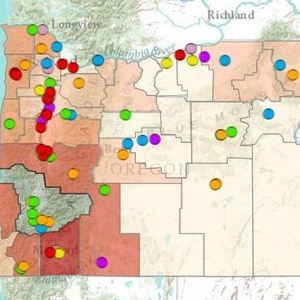Oregon declares biomass carbon neutral




Oregon.gov
June 25, 2015
BY Anna Simet
After a House vote of 44-9, Oregon Gov. Kate Brown has signed a bill that exempts biomass-derived carbon dioxide emissions from regulation under certain air pollution laws.
The bill defines biomass as nonfossilized and biodegradable organic materials that originate from plants, animals and microorganisms and that are products, byproducts, residues or wastes from agriculture, forestry and related industries; nonfossilized and biodegradable organic fractions of industrial and municipal wastes; and gases and liquids recovered from the decomposition of nonfossilized and biodegradable organic matter.
It also states that biomass would not be exempt from air pollution laws in cases that would conflict with the federal Clean Air Act.
Advertisement
Advertisement
Numerous individuals testified during a public hearing held in late May, the majority of which were in support of the bill. Representing the Sierra Club’s Oregon chapter, which was not in favor of its passage, Rhett Lawrence described the bill as being “deeply flawed…Committee members may have seen in the record the November 2014 memo from Janet McCabe of the EPA. That memo indicates an expectation that biomass would be exempt from carbon control requirements in the EPA’s Clean Fuels Program. However, it bears noting that that was an interim report and it does not reflect a final decision. The EPA’s program is still in rulemaking, so if nothing else, this bill is premature…”
Lawrence’s testimony describes trees as “a major source of biomass used as fuel,” but “generally a poor choice of fuel for power production. Forests store carbon from the atmosphere, and when burned, all the carbon that has been sequestered is instantly released back into the atmosphere. By labeling biomass as carbon neutral. By labeling biomass as carbon neutral, this bill would amount to a policy that could promote logging to reduce carbon emissions.”
Advertisement
Advertisement
Mark Nystrom testified on behalf of the Association of Oregon Counties, which he said believes will remove a barrier to increased investment in biomass production, which is good for Oregon and the counties. He said benefits include increased energy independence for Oregon, lowering Oregon’s carbon footprint, and stimulating new economic investment and green job opportunities, especially in rural areas. “While there have already been a number of investments statewide in biomass facilities, the state is nowhere near the capacity for more. By exempting carbon dioxide emissions from biomass the legislature can provide investors more certainty in their future investment into biomass facilities.”
Others testifying in support of the bill included the Oregon Forest Industries Council, Northwest Pulp and Paper Association, America Forest & Paper Association, the American Wood Council, Oregon’s Cattlemen Association, PacifiCorp and Sustainable Northwest.
Bob Cleaves, president of the Biomass Power Association, said signing of the bill comes at a time critical to the biomass industry."This is an especially important precedent to set before states begin to draft carbon reduction plans under the EPA's Clean Power Plan," he said. "Oregon has proven to be a solid leader in state biomass policy. We commend the leadership of Senators Chris Edwards and Tim Knopp, and we hope to see other states following Oregon's lead soon."
Related Stories
The U.S. Department of Energy Bioenergy Technologies Office (BETO) announced up to $23 million in funding to support research and development (R&D) of domestic chemicals and fuels from biomass and waste resources.
The U.S. DOE has announced its intent to issue funding to support high-impact research and development (R&D) projects in two priority areas: sustainable propane and renewable chemicals and algal system cultivation and preprocessing.
Sens. Sherrod Brown, D-Ohio, and Pete Ricketts, R-Neb., in August introduced the Renewable Chemicals Act, a bill that aims to create a tax credit to support the production of biobased chemicals.
The Chemical Catalysis for Bioenergy Consortium, a consortium of the U.S. DOE’s Bioenergy Technologies Office, has launched an effort that aims to gather community input on the development of new biomass processing facilities.
USDA on March 8 celebrated the second annual National Biobased Products Day, a celebration to raise public awareness of biobased products, their benefits and their contributions to the U.S. economy and rural communities.
Upcoming Events










